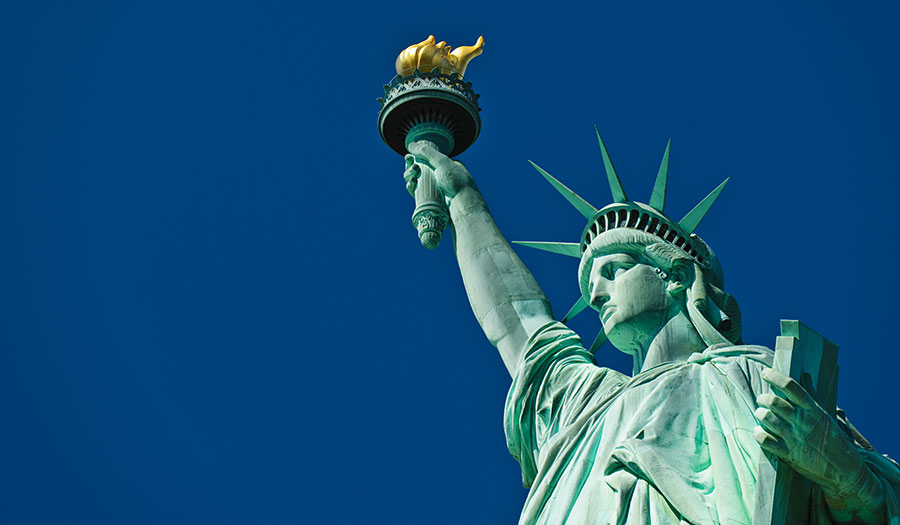 Getty Images
Getty Images
Article
Surveying the current state of liberty around the world and reexamining the historical events that led the United States to greatness reveal the true source of prosperity. It also shows how America can continue to thrive.
Learn the why behind the headlines.
Subscribe to the Real Truth for FREE news and analysis.
Subscribe NowThe wind and sea whipped at the tiny Mayflower as it crossed the Atlantic Ocean. Waves battered the creaking vessel, which had been at sea for more than a month.
Those on board fought freezing temperatures, dysentery, severe storms, diseases and a host of other challenges. Supplies dwindled and the ship’s 20-plus despairing crew members and more than 100 passengers wondered if they would ever see land again.
The merchant vessel was not designed to hold the extra 102 men and women squeezed into its cargo hold—a cramped, windowless living space only five-and-a-half feet tall—some of whom were fleeing religious persecution. Before traveling west, they had lived in the Netherlands and Britain, but had not found freedom.
No place but the New World would grant them the ability to live as they believed.
After a 66-day voyage, the ship finally arrived at Plymouth Harbor in November 1620.
Even after reaching land, a harsh winter forced the travelers to stay on the vessel for several more months. As freezing temperatures wore on, starvation set in. Without clean food or adequate shelter, over half of the original passengers died from exposure to the cold or starvation.
Despite their challenges, those on board who had been religiously persecuted focused on attaining something greater than their individual lives—they sought freedom. They saw physical trials as a small price to pay for the right to practice what they believed. Their actions paved the way for the U.S. to become the Land of the Free and Home of the Brave, a place where people could live as they saw fit.
From the pilgrims to America’s Founding Fathers, freedom has always been woven into the fabric of U.S. society. Early Americans believed all men were created equal and entitled to seek life, liberty and the pursuit of happiness.
This mindset spawned the most powerful democratic country in history. Since then, America has stood as a symbol of hope. Any person, through hard work, determination and exercising the freedoms granted to them, could build a better life.
Most accept without question that freedom is what drove the U.S. to greatness and the very reason it has become the global standard for prosperity. Yet is the ability to choose one’s own destiny really what secured America’s place among the greatest nations in history?
Defining Liberty
The definition of freedom is different for everyone. To some, it is the ability to exercise personal liberties such as holding a job, starting a business, or providing for a family. For others, it is freedom of the press or the free access of information. For yet others, it is the choice of a particular religion.
Many countries have established national holidays that celebrate their freedom—most of which are modeled after that of America’s Independence Day on July 4.
In South Africa, political freedom is commemorated on April 27, when the first democratic election was held in 1994. India celebrates the end of Great Britain’s colonial rule on August 15. Mexico recognizes its country’s freedom from Spanish colonization on September 16. The French celebrate freedom from monarchical rule on July 14, the date they stormed the Bastille—which was a turning point in the French Revolution. Israel celebrates the establishment of the modern Jewish State on the 5th of Iyar, which falls between April and June on the Roman calendar. And on February 1, America observes “National Freedom Day,” which commemorates when all slaves gained their freedom under President Abraham Lincoln.
 Thinkstock
Thinkstock
While there has been some success in attaining a certain amount of freedom worldwide, news headlines are still filled with reports of slavery, political oppression, tyranny and corruption, especially in underdeveloped countries. According to the Global Slavery Index, a reported 46 million people live in situations where they are forced to provide free labor, be it physical or sexual.
For decades, nations have thought that securing American-style freedoms would bring prosperity, peace and abundance. Yet the state of the world proves it is not so simple. In fact, freedom is actually declining across the globe.
Sad State of Freedom
Examining the amount of liberty worldwide reveals it is disappearing despite nations yearning for it like never before. It also shows how unique America’s success story really is.
The U.S. watchdog organization Freedom House produces an annual report titled “Freedom in the World,” which measures the state of freedom internationally. It assigns each country a value of “free,” “partly free,” or “not free.”
After gathering reports from over 90 analysts worldwide, its 2016 study projected an overall decline in freedom for the 10th consecutive year. Of the 195 countries and 15 territories included, 86 countries were ranked as “free,” while 59 were “partly free” and 50 were “not free.”
This means a whopping 36 percent of the global population lives under tyranny!
Such a steep decline in freedom can be attributed to parallel conflicts along with ongoing political suppression in China, according to the report.
Take Russia and Ukraine, for example. In 2014, the southern Ukrainian state of Crimea voted to become part of Russia. Many called into question the legitimacy of the poll results and believed Moscow illegally annexed the region.
Another example is Azerbaijan, an oil-rich country, which allegedly violated property rights and forcibly assumed control of private land to continue oil production.
Neighboring Kazakhstan was also accused of broadening laws against religious gatherings in homes and sending secret police to arrest offenders.
In addition, Belarus, Turkmenistan and Uzbekistan consistently earn the worst freedom ratings, according to the report.
Of the 18 countries in the Middle East, Israel was considered the only “free” nation, with 12 nations, or 66 percent of the region, classified as “not free.” These rankings, in almost every case, were caused by the 2011 Arab Spring uprising.
Ironically, this political movement was an attempt to bring greater freedom.
While protesters deposed certain leaders throughout the region, they failed to bring stability. Places such as Libya showed promise after the uprising, but weak transitional governments have given place to terrorist groups that seized control.
The civil war in Syria, which has now claimed an estimated 500,000 lives, has been responsible for the greatest humanitarian crisis in recent history. Mass killings, chemical warfare, persecution of clergy and civilians, use of child soldiers, and widespread rape have resulted in a massive exodus and put a strain on the infrastructure of neighboring countries.
Syria’s war and instability in Iraq have resulted in the rise of the Islamic State terror group. Because of such developments, Gulf nations are building up their militaries, cracking down on political dissenters, and expanding sentencing for cybercrime violations. This area is widely regarded as the “least free” region in the world today.
Sub-Saharan Africa continues to struggle as well with 82 percent of its 49 countries either “not free” or “partly free.” According to the report, this region is characterized as “volatile,” as government coups and political schisms regularly affect it.
On top of this, the area continues to grapple with terrorist attacks, such as the 2015 siege of a luxury hotel in Bamako, Mali. Reports after the event indicated that the government used this as an excuse to further restrict personal freedoms.
In addition, terror group al-Shabab killed almost 150 individuals in an attack on a university in Garissa, Kenya. This prompted the government to enhance its national counterterrorist campaign, a move that allegedly employed secret extrajudicial killings, kidnappings and unwarranted political suppression.
Africa’s decline is accompanied by the desertion of power by many Western democracies. The European Union, England, America and Germany have been focusing on domestic issues and reducing aid to these locations. Additionally, the U.S. has pulled back from strategic conflict zones in Pakistan and Iraq, which have experienced an increase in sectarian violence.
How Is America Different?
In light of these worldwide conditions, the United States and other Western nations stand out even more as anomalies. Not only do most citizens of these countries live in relative peace, they can exercise political, civil and religious freedoms openly. Virtually all, even the poorest in these societies, are more prosperous than their counterparts in the rest of the world.
In the United States, a commonly held belief by politicians, preachers and leaders is that the hard work of common Americans brought about their prosperity. Their extraordinary successes and breakthroughs certainly do suggest a uniqueness to the country, but it is not the only way it happened.
 Thinkstock
Thinkstock
Many also credit the Founding Fathers and their political ideas that birthed America’s governing bodies. This includes the U.S. Constitution and Bill of Rights, which are supposed to have guaranteed its citizens preeminence in the world.
On its face, these arguments seem reasonable, especially when considering America’s position in the world.
While the United States represents around 4.5 percent of the global population, it controls 29 percent of the world’s total gross domestic product. Its economy is the largest in the world, twice that of China, and is almost unmatched in terms of per capita income per household.
Additionally, no other country is home to the variety and amount of mineral wealth, oil, natural resources, and arable land readily available.
In terms of manufacturing, America was the first nation to employ standardization in construction, vastly outmatching the output of other countries throughout the 19th century. An influx of immigrants bringing cheap labor, new skills, and inventions over the last 100 years has bolstered the country’s productivity and technological sectors.
Militarily, while the nation has suffered setbacks in recent decades, it remains the largest and most dominant military player in the world—by far. According to the Lexington Institute, in 2012, America boasted 50 percent of all military spending globally. It was responsible for ending World Wars I and II, the Cold War, and dozens of smaller conflicts, and continues to have the potential to be a virtually unstoppable military force.
This picture stands in stark contrast to the rest of the globe, except for certain other Western countries. Given that nations have attempted to replicate the winning American model over and over—and been met with middling or worse results—its uniqueness must have a different cause than mere freedoms.
In fact, a great unseen hand guided the U.S. to greatness.
Why Is America Different?
Most are unaware that the blessings received by America were foretold millennia ago as a result of the obedience and faith of the biblical patriarch Abraham. He was the original “founding father” of the ancient nation of Israel. Due to his obedience to God, a powerful prophecy was given and greatness was promised to his ancestors: “That in blessing I will bless you, and in multiplying I will multiply your seed as the stars of the heaven, and as the sand which is upon the sea shore; and your seed shall possess the gate [sea gates] of his enemies; and in your seed shall all the nations of the earth be blessed; because you have obeyed My voice” (Gen. 22:17-18).
These same blessings were passed from Abraham to his son Isaac and then to Jacob, who was later renamed Israel. God made similar promises to Israel (Jacob) for his obedience: “…be fruitful and multiply; a nation and a company of nations shall be of you…” (35:11).
There are only two entities throughout all of history that fit such descriptions—America (a nation) and the United Kingdom (a company of nations). The U.S. originates from the ancient nation of Israel, and its people are the descendants of Abraham. Through him, the U.S. has received birthright blessings from God.
America has risen to prominence and become one of the most abundant nations ever as a direct result of God’s blessings, not the efforts of men.
This is the real story of why Americans enjoy such freedoms.
Yet God’s blessings were not promised to last forever. To learn more, read David C. Pack’s free book, America and Britain in Prophecy.
Freedom Is Not Everything
If America was able to bring about freedom and prosperity through its own power, then surely it could guarantee lasting happiness to its citizens.
Yet this has not been the case.
The blessings that Abraham secured were due to his faith and obedience to God. Abraham understood that God presented him and all others who would come after him the opportunity to follow His ways and receive blessings. Many conditional promises God made are listed in Deuteronomy 28, which detail both blessings from obeying God and the ill effects for those who disobey. Abraham firmly understood God’s Way and chose to follow it. As a result, his descendants reaped the benefits of his obedience.
Realize: If America would follow God’s Law—they could secure true and continued happiness and prosperity!
 Thinkstock
Thinkstock
Although the U.S. has never followed the Bible’s commands and statutes to the letter, many were used in the founding of the nation. In addition, people used to both read and attempt to live God’s Word as best they understood it. This all had the potential for blessings on an individual level.
Yet America is pulling away from Bible-based religion. A Pew Research Center study from 2014 found that the number of people who identify as Christians has dropped by roughly 8 percent in the last seven years. In addition, the study found that Millennials (those between the ages of 18 and 24) are far less likely to affiliate with organized religion, with over 36 percent unaffiliated with any denomination. This number is only slightly lower among the previous two generations of Generation X and the Baby Boomers.
Interestingly, nearly a quarter of Generation X has left organized religion altogether and now identify as either agnostics or atheists. Also, nearly one-in-five U.S. adults raised in a religious home went on to give up their faith in adulthood. Of those polled, one-third were raised Catholic, of which 41 percent no longer identify with that religion. These were by far the worst losses found in the study.
As the U.S. has become more secular, it is increasingly focused on physical prosperity. Five years ago, Worldwatch Institute released a study titled “The State of Consumption Today,” in which its author stated, “The failure of additional wealth and consumption to help people have satisfying lives may be the most eloquent argument for reevaluating our current approach to consumption.”
Put simply, in a materialistic society, the goal of earning ever-increasing amounts of money has proven to be unfulfilling. And when citizens become apathetic toward the blessings they enjoy and toward the God who provided them, a decline in society is unavoidable.
Pursuing Happiness
The missing piece in American prosperity—and societies around the world—is true joy. But even with blessings from God of immense abundance, man is still ill-equipped to achieve true happiness and fulfillment on his own. While he has sought to implement systems of government, religion and politics to ensure prosperity, no society has achieved lasting peace and happiness for all. Humanly devised systems are always temporary.
Without God’s guidance, man’s pursuit of prosperity and happiness always leads to a wrong end.
Yet true joy is achievable! The God of the Bible is willing to teach us His laws, which result in happiness. The ancient King David understood this, and declared: “In Your [God’s] presence is fullness of joy” (Psa. 16:11).
Jesus Christ also promised His followers peace and joy (John 14:27; 15:11). These two qualities are also fruits of the Spirit mentioned in Galatians 5:22-23.
This passage describes the Spirit of God. When converted, a Christian must build on these characteristics, which in turn produce God’s character—resulting in an immense amount of joy!
Understand. Exercising freedoms in any form, unless tempered by God’s Law, will always produce bad fruit. But living His Way and building His character always yields lasting joy.
Real Truth Editor-in-Chief David C. Pack expanded on the search for joy in his article “You Can Live the Abundant Life!”: “Never has the world had so much, yet been so miserable. Depression, unhappiness, confusion, frustration, unfulfilled hopes and dreams, dissatisfaction, emptiness—and hopeless misery—describe humanity the world over.
“The United States Constitution guarantees people the right to ‘life, liberty and the pursuit of happiness.’ While the framers of the Constitution understood they could guarantee the American citizenry certain civil liberties and freedom from oppression, they understood they could not guarantee happiness. They could only seek to guarantee one’s right to ‘pursue’ it.
“Many are pursuing happiness, but in all the wrong places!”
To understand how you can secure true and lasting happiness, read the rest of Mr. Pack’s article. God longs to give all nations and individuals a joy-filled life—for all who will pursue it.



